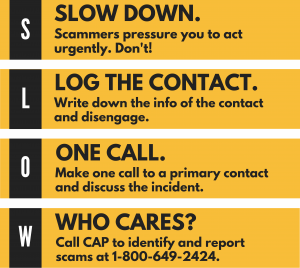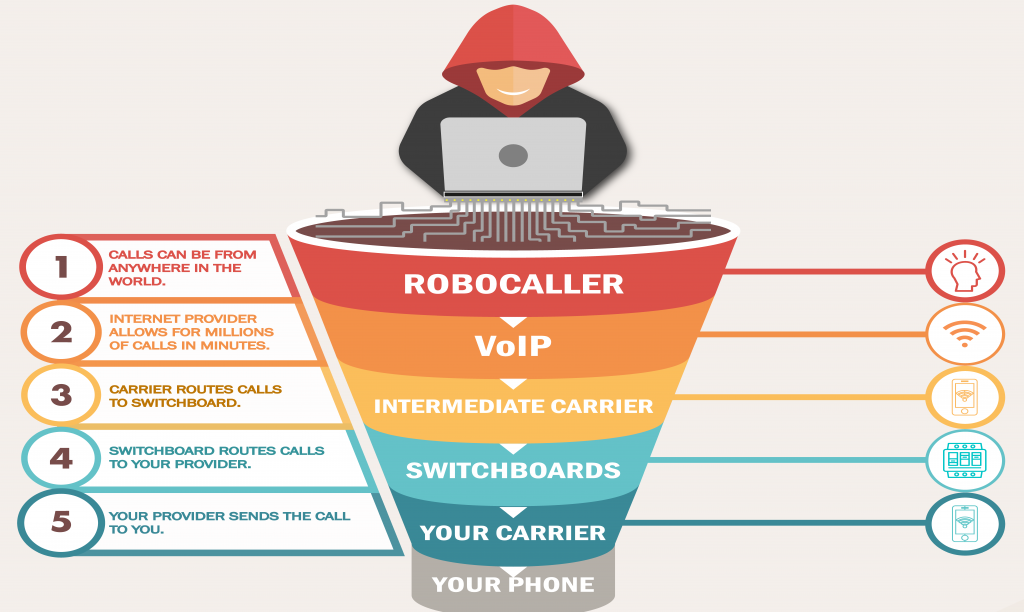Did you encounter a scam? Report it to CAP!
Your report helps us track scam trends and alert the public about scams. If you experienced monetary loss or provided the scammer with sensitive personal information, our office can offer support. Use the form above to report the scam.
Learn about scams and share information with your community
Scams and fraud cost Vermonters millions of dollars every year. Scammers use every tool available to steal money and information from consumers. Since most scams originate overseas and use sophisticated technology, we can't stop them with traditional law enforcement means alone.
Stopping Scams Together: To stop scams, we need to work together to protect Vermonters from losses to scams and fraud. You can help stop scams by learning about scams and sharing information with your community.
Get informed
Stay informed to protect yourself and others! To receive alerts from the Vermont Attorney General, state agencies, and local government about scams impacting Vermont, complete the VT-ALERT registration and select "Scam Alert". Alerts can be delivered to your phone by text message, recording, or you can opt to receive emails. For registration assistance, contact VT-ALERT. For registration updates, sign back in to your VT-ALERT account.
Find information about common scams on this website, our CAP Connection blog, our Facebook page, or the FTC Scam Alerts site.
Spread the word
Share what you know with others so they can protect themselves from loss. Whether it's around the dinner table, out with friends, visiting with relatives or chatting with co-workers, make sure those around you stay informed and aware!
Watch and Share Our Imposter Scam Prevention Videos
Watch videos to learn about imposter scams and prevention strategies to avoid scams. The video project was produced using funds obtained through the Sears Consumer Protection and Education Fund. Scripts and resources were developed in-house at the Consumer Assistance Program, calling on personal accounts of courageous Vermonters, who were willing to share their stories with one goal in mind: to help prevent scams from happening to others. A supplemental tool kit with handouts was also produced. Watch the videos and share the resources widely.
Take action to prevent loss
If you or someone you know are being targeted by scammers, there are a few simple steps you can take:
- Hang up! Scammers will try to keep you on the phone. The best way to avoid getting scammed is to hang up the phone. Don't try to talk with them, just end the call. If the conversation is online or by text/e-mail, stop responding, or block the sender.
- Call us! Whether you need help for yourself or someone else, we want to talk with you. If it is outside of our normal business hours, you can send us an e-mail or leave a voice message. If you need immediate assistance, contact your local law enforcement agency or call 2-1-1 for information and referrals to other helping agencies.
- Stop payment! If money has been sent (by wire transfer, mail, gift card, or any other means), contact the bank or institution you sent it through right away to stop the money before it is picked up. Usually the funds are picked up quickly by scammers, but it's worth trying!
Make a Scam Prevention Plan
Slow down and follow a plan to not get scammed. Practice the slow method in all consumer transactions and especially during urgent interactions. Offer to be a person's primary contact to discuss potential scams.

S – SLOW DOWN.
Scammers pressure you to act urgently. Take time to regain your calm.
L – LOG THE CONTACT.
Write down the phone number of the contact and disengage.
O – ONE CALL.
Make one call to a primary contact, such as a friend or family member, and discuss the incident.
W – WHO CARES?
Call an organization in your life who cares. CAP can help you to identify and report scams at 1-800-649-2424.
Help stop robocalls
Illegal scam and telemarketing calls lead the list of complaints filed with the Vermont Attorney General’s Consumer Assistance Program (CAP). The telephone system was simply designed: to get calls through. It works really well. But it is broken.
Current Robocall Climate
The Federal Trade Commission (FTC) estimates that almost half of the phone calls made every day in this country are robocalls. Making phone calls is now so cheap that it is possible for robocallers to make a million calls a day. With such a high number, only a few people need to fall victim for such illegal activity to be highly profitable. As of June 2021, there will be more federal protections against fake CallerID’s, but this effort will take time to implement. Many of these calls are from outside the country or by fly-by-night businesses.
Report robocall violations to CAP
The Vermont Attorney General is working with a national task force to analyze, and potentially take action against, companies that allow these illegal calls, in alliance with federal agencies such as the IRS and Social Security Administration.
To stop unwanted robocalls, use the protection built into your phone if you have a cellphone or VOIP landline. What you can do to protect yourself from illegal traffic—before it rings to your phone—depends on the type of phone that you have and whether you run a business. To cease legitimate telemarketing solicitations, put your phone number on the FTC Do Not Call registry.
Robocallers use the phone as a weapon
In 2020, FTC figures showed scammers used phone calls 31% of the time and text messages 27% of the time to defraud consumers. These figures mean that the telephone is the weapon of choice in 59% of frauds—that expensive device in your pocket could rob you!
Take steps to verify with whom you are speaking or texting
You may be dealing with an international crime syndicate pretending to be a person or business or government agency that you trust. Illegal callers use fake CallerID to "spoof" and impersonate someone that you trust. Don’t be fooled! Let it go to voicemail. If the voicemail sounds genuine, then don’t use the callback number. Instead, look up the correct number yourself. Follow the SLOW Method outlined above.
Call Blocking Options
Cellphones
Best solution for cellphones: Configure the phone to block unknown callers. If you have a personal cellphone, the best solution is to set your phone not to ring except when you already know the caller. Everyone else goes to voicemail.
- On an iPhone, go to Settings, Do Not Disturb and put the switch on for “Always.” Then, under the same Do Not Disturb, go to Phone, and set to “Allow Calls From: All Contacts.”
- On an Android phone, go to Settings, then Sound, then Do Not Disturb preferences, then Priority only.
- Set “Calls” to “From contacts only.”
- Turn on “Do Not Disturb” to “Priority only” mode.
- Swipe down from the top of your screen with 2 fingers.
- Under Do not disturb or your current option, tap the Down arrow, then Turn on Do not disturb, Pick Priority only.
- Choose how long you want this setting to last and Tap Done.[/su_spoiler]
Third Party Apps for VOIP and Cellphones
An alternate solution for VOIP landlines and Cellphones: use third party apps to block illegal callers. Another approach is to buy an app designed to block illegal phone traffic.
- These apps are not perfect, but maintain data on illegal callers and prevent them from ringing to your phone.
- Two that we have some knowledge of are NomoRobo and YouMail. For a cellphone, these apps cost a few dollars per month. They do not block all illegal traffic. For a business that cannot block all unknown calls, these are the best solutions.
If you have a VOIP landline, the VOIP line can probably be configured to use the NomoRobo service. For business lines, you may need to get the service through third parties like Mutare or SkySwitch. These services are not a perfect solution, but can save valuable time during the day in not having to answer robocalls.
Analog - Plain Old Telephone Service Lines
For analogue telephone lines like Consolidated Communications POTS lines. Unfortunately, the most reliable phones are old-style regulated analogue plain old telephone service (POTS) lines. POTS lines are not covered by new FCC regulations because the technology is analogue and obsolete. However, POTS phones are very reliable. The only—but highly imperfect—approach for POTS lines is to buy an add-on device that connects to the phone. These devices present the user with another option: press the red button to block the call. These devices use an internal database that is incomplete and not updated as frequently as digital apps and cost $50 to $100. Nevertheless, for POTS phones, such imperfect devices are the only solution other than relying on CallerID. Here are some options:
- HQTelecom.com Landline Call Blocker: Requires user to block numbers manually by pressing a “block” button as calls come in. – $59.
- Sentry Dual Mode Call Blocker: Callers must prove they are legitimate by listening to a recorded message and pressing “0” when prompted. The message is recorded in a British accent, which may cause some callers to think they have reached a wrong number. – $59.
- CPR Call Blocker Protect: Uses whitelist only- so will block every call not on the list. – $50-100.
- Telezapper TZ 900: Uses a special tone that tells predictive dialing computers that a number is disconnected. – $40.
- T-Lock Call Blocker Version 5: Requires Caller ID to be activated. Can block incoming and outgoing phone numbers and calls without an ID. Stores the last 100 incoming and 50 outgoing calls. – $39.
- Pro Call Blocker Version N2: Can block entire area codes and prefixes. Blocks incoming and outgoing phone calls and calls without an ID. Stores incoming and outgoing call records. Requires password to remove blocked numbers from list. – $43.
PLEASE NOTE: THE LIST ABOVE IS PROVIDED FOR INFORMATIONAL PURPOSES. THE VERMONT ATTORNEY GENERAL’S OFFICE DOES NOT ENDORSE ANY PRODUCT OR SERVICE. PRICES MAY VARY.[/su_spoiler][/su_accordion] The telephone system has almost no built-in protection against scammers. Federal and state authorities are working to fix a broken system. In the meantime, protect yourself and your loved ones. And be alert. Report fraud.
Protect your information from identity theft
What is identity theft? Vermont law defines identity theft as the unauthorized use of another person's personal identifying information to obtain credit, goods, services, money or property (for more information on Vermont laws regarding privacy and data security, click here). In many cases, identity theft involves the fraudulent use of your credit card or bank account information. In some cases, your social security number and other personal information may be used to fraudulently obtain driver's licenses, lines of credit, loans or other consumer accounts. Protect your identity by never sharing your personal identifying information with parties you cannot verify.
I think I am a victim of identity theft. What steps should I take?
Know the common scams
Learn About the Latest Scams on the CAP Connection Blog
IRS Debt Collection
A scam telephone call saying you owe “back taxes” or outstanding payments due to the government, typically from callers claiming to be “Internal Revenue Service”, “IRS”, and “US Treasury and Legal Affairs.” Don’t respond to these callers. If you think you may actually owe back taxes, hang up and contact the IRS directly at 1 (800) 829-1040.
Computer Tech Support
Caller or pop-up message on computer which claims to be from Microsoft/Windows or other tech company claiming there is a virus or other serious problem with your computer. They will try to persuade you to give remote access to your computer. Never allow remote access to your computer or click links in a strange e-mail or pop-up message! Turn off your computer! Do not pay an unknown entity!
Phishing
Attempts to collect personal and sensitive information, which is typically used to steal someone’s identity. In the most common phishing scams, the perpetrator claims to be calling from a person’s bank and requires account information to re-activate their account. Never give account information to unknown callers! Don’t respond to emails that request this information!
Debt Collection
Calls from fake debt collectors making threats, including lawsuit, wage garnishment, and arrest. Most attempt to collect nonexistent debts and even make claims that utilities will be disconnected if payment is not made immediately. Never pay a harassing collector over the phone; demand proof of the debt in writing and verify the debt with the original creditor! If you are concerned about possible disconnection, hang up and contact the vendor directly!
Business-Targeted Scams
Vermont businesses were also on the receiving end of scams, including utility disconnection threats, unsolicited/fake invoices, fake orders of goods or services, imposters of business personnel, and IRS debt collection scams. The imposter of business personnel scam was particularly concerning as the businesses are contacted by someone that claims to be their CEO, or other internal business representative, which can be easily fabricated. Once connected, the imposter CEO or other employee requests a large bank wire transfer, which is typically irretrievable. It is important that businesses establish internal processes to ensure payments are being sent to valid sources!
Unclaimed Funds- Grants, Rebates and Settlements
Calls, mailings and e-mail messages claiming that you are eligible for a government grant, and unclaimed rebate or settlement, or other unclaimed funds. No legitimate grant will require you to pay a fee for processing, and you can find out if there are unclaimed funds in your name by contacting the Vermont Treasurer's Office.
Phony Prizes, Lotteries and Sweepstakes
Claims that recipient will obtain funds if they pay an upfront fee, typically for registration or taxes. These scams usually start with a phone call or mailing, claiming that you won money or a prize, but have to make a payment in order to receive it. Sometimes realistic-looking fake checks are used to entice the victims and claim to cover a portion of the fees. The check bounces and no “winnings” are ever dispersed. Never pay upfront to receive winnings! If you won something, they should pay you, not the other way around!
Medical Products and Supplies, Insurance and Prescription Scams
Callers claim to be with Medicare or Medicaid, seeking personal information or claiming they are the authorized provider of medical supplies, prescriptions or other services. Verify any such call with your insurance provider separately, or with your physician. Never give out your personal information to a caller!
Grandparent and Other Impostor Scams
Scammers claiming to be a grandchild, friend/relative or romantic interest contact consumer, reportedly in distress and needing money to be wired or transmitted with a reloadable card, gift card (like iTunes), PayPal account payment, cash or check/money order. Never wire or otherwise send funds unless you can verify the emergency!
Craigslist/Online Listings Scams
These on-line scams involve fake rental listings and requests to cash a fake check and send money to a shipper/agent in order to complete an online transaction. Be cautions when dealing online. Never give out personal information before seeing a rental listing in person. Be suspicious when someone wants to pay you more for something than what it is worth; make arrangements to pay in cash and in person whenever possible!
Scam Recovery
Click the Scam Recovery link to get recovery steps and information.




